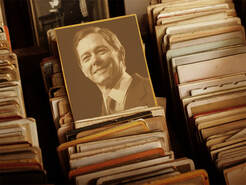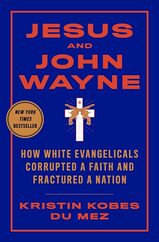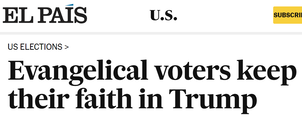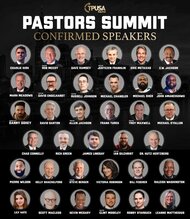Trumpvangelicalism/maga
Time for Christian evangelicals to part ways with Trump
As former President Trump vies for another shot at the White House, one loyal demographic he is counting on is white Christian evangelicals. More than 80% of evangelicals backed Trump in the 2020 election, and after endorsing a Louisiana law requiring the Ten Commandments to be displayed in public school classrooms, he’s gearing up for a repeat in 2024.
(Straight Arrow News 6/28/24) Read More>>>>>
As former President Trump vies for another shot at the White House, one loyal demographic he is counting on is white Christian evangelicals. More than 80% of evangelicals backed Trump in the 2020 election, and after endorsing a Louisiana law requiring the Ten Commandments to be displayed in public school classrooms, he’s gearing up for a repeat in 2024.
(Straight Arrow News 6/28/24) Read More>>>>>
Time for Christian evangelicals to part ways with Trump
As former President Trump vies for another shot at the White House, one loyal demographic he is counting on is white Christian evangelicals. More than 80% of evangelicals backed Trump in the 2020 election, and after endorsing a Louisiana law requiring the Ten Commandments to be displayed in public school classrooms, he’s gearing up for a repeat in 2024. (Straight Arrow News 6/28/24)
Read More>>>>>
As former President Trump vies for another shot at the White House, one loyal demographic he is counting on is white Christian evangelicals. More than 80% of evangelicals backed Trump in the 2020 election, and after endorsing a Louisiana law requiring the Ten Commandments to be displayed in public school classrooms, he’s gearing up for a repeat in 2024. (Straight Arrow News 6/28/24)
Read More>>>>>
Today’s MAGA evangelicals have become a horde of cruel behaviorists swallowed by a pseudo-religion. Unlike Jonah and the Big Fish, repentance and forgiveness by MAGA are seen as weakness and cruelty as virtue. Of course, they would say you don’t understand because you are of the world. |
You Cannot Argue with a MAGA Evangelical
Evangelicals are fundamentalists; they believe every letter, word, and paragraph in the Bible is the word of God, and calling the stories in the Bible parables is akin to blasphemy. Faith requires you to believe that the “word” is inspired and penned by God. Scientific proof of the age of the Universe and Earth falls on deaf ears. When secularism questions miracles like the parting of the Red Sea or raising the dead, they are met with a familiar refrain I have heard my entire life. Anyone raised in a Baptist, Holiness, or Evangelical church has either used or listened to the phrase that ends all queries; ‘You don’t understand because you are of the world.’ That thinking is precisely why church attendance and faith are waning in America. Current evangelism in America is discussed and defended in the same way conspiracies are used to deny the obvious. Unlike when man first understood the horizon meant the earth was round, MAGA evangelicals have sailed into the horizon with discontent, degradation, and cruelty and have flattened their brains to the truth. Their messiah-like figure is Donald Trump. MAGA erected a golden image of him, ignored his exploitation of the Bible, applauded his cruel treatment of the stranger, and defamed his rape victim, spurring his supporters to threaten her with further sexual assault. When confronted by obvious hypocrisy, they will point to imperfect characters in the Bible. They first invoked the story of Cyrus the Great, who liberated the Jews but professed not to believe in the God of the Bible, and when challenged, switched their comparisons to King David. (ReasonaBill/Daily Kos 1/19/24) READ MORE>>>>> |
MAGA 'Prophet' Claims Biden Admin Covering Up Killings in White House
Pastor Julie Green, a self-proclaimed "prophet" and supporter of Donald Trump's Make America Great Again (MAGA) movement, recently claimed that President Joe Biden's administration is covering up killings in the White House. Green frequently posts videos on streaming channels for her Julie Green Ministries International in which she shares messages that she claims God sends to her. During a livestream posted on the right-wing social media platform Rumble on Friday morning, she said that "there has been a lot of death that is at the White House that they have tried to coverup." Newsweek is not aware of any reports of killings or unusual deaths in Biden's White House. (Rachel Dobkin/Newsweek 11/18/23)
Read More>>>>>
Pastor Julie Green, a self-proclaimed "prophet" and supporter of Donald Trump's Make America Great Again (MAGA) movement, recently claimed that President Joe Biden's administration is covering up killings in the White House. Green frequently posts videos on streaming channels for her Julie Green Ministries International in which she shares messages that she claims God sends to her. During a livestream posted on the right-wing social media platform Rumble on Friday morning, she said that "there has been a lot of death that is at the White House that they have tried to coverup." Newsweek is not aware of any reports of killings or unusual deaths in Biden's White House. (Rachel Dobkin/Newsweek 11/18/23)
Read More>>>>>
Evangelicals' fears of witchcraft made them perfect marks for Trump's lies: columnists
After weeks of infighting and multiple failed candidates, Republicans finally have a new House speaker in Rep. Mike Johnson (R-LA), a lawmaker who has proven sympathetic to young-earth creationism and who also played a key role in former President Donald Trump's plot to overturn the 2020 presidential election.
As if that weren't enough, he even tried to start a Satanic panic about an adult cartoon show starring Danny DeVito last year. All these beliefs being held in parallel is not a coincidence, argued Amanda Marcotte for Salon — it represents a pathology that runs deep in the evangelical community. (Matthew Chapman/Raw Story/10/31/23)
Read More>>>>>
After weeks of infighting and multiple failed candidates, Republicans finally have a new House speaker in Rep. Mike Johnson (R-LA), a lawmaker who has proven sympathetic to young-earth creationism and who also played a key role in former President Donald Trump's plot to overturn the 2020 presidential election.
As if that weren't enough, he even tried to start a Satanic panic about an adult cartoon show starring Danny DeVito last year. All these beliefs being held in parallel is not a coincidence, argued Amanda Marcotte for Salon — it represents a pathology that runs deep in the evangelical community. (Matthew Chapman/Raw Story/10/31/23)
Read More>>>>>
Eric Trump Is Coping with Dad Donald's Indictments By Turning To A Divisive Resource
While Eric Trump’s wife Lara Trump recently tried to dispel worries about Donald’s age, Eric took a different route: by talking to self-proclaimed prophets about his father’s future. In a video reposted by the YouTube account Trồng Rau Sạch, and details obtained by Newsweek, the Understanding Trump author was seen speaking with self-proclaimed prophet Julie Green and ReAwaken America founder Clay Clark. In the video, Green tells Eric not only that God is allegedly protecting his father, but that her alleged messages from God dictate that he is on Donald’s side. (Delilah Gray/Yahoo 9/10/23)
Read More>>>>>
While Eric Trump’s wife Lara Trump recently tried to dispel worries about Donald’s age, Eric took a different route: by talking to self-proclaimed prophets about his father’s future. In a video reposted by the YouTube account Trồng Rau Sạch, and details obtained by Newsweek, the Understanding Trump author was seen speaking with self-proclaimed prophet Julie Green and ReAwaken America founder Clay Clark. In the video, Green tells Eric not only that God is allegedly protecting his father, but that her alleged messages from God dictate that he is on Donald’s side. (Delilah Gray/Yahoo 9/10/23)
Read More>>>>>

June 30, 2023:
According to Public Religion Research Institute, Donald Trump’s most ardent, enthusiastic Christian supporters are arguably Pentecostal and charismatic. Televangelist Paula White-Cain, the former president’s “personal pastor,” and a host of Pentecostal and charismatic celebrity supporters enthusiastically visited Trump’s White House, dominated his “evangelical advisory board,” and were his staunch defenders after his 2020 defeat.
In the wake of Trump’s 2016 election, critics insisted that neither Paula White-Cain, nor the television audience she brought with her represented “mainstream evangelicalism.” Our new research demonstrates that among those who identify as “born again/evangelical,” however, charismatics and Pentecostals are growing rapidly, with political implications for future evangelical/born again activism.
Pentecostals, largely born out of early 20th century revivals, formed denominations wherein supernatural experiences recorded in the Bible like speaking in tongues (ecstatic speech or speech-like sounds believed to be from God), divine healing, and prophecy were practiced by contemporary Christians.
While Pentecostalism grew, charismatics, a diverse collection of denominational and non-denominational Christians also began emphasizing these practices in the mid to late twentieth century. For decades, such practices were discouraged or even banned by evangelical leaders, until the growth of charismatics forced them to reconsider.
In 2006, Pew Research Center reported that charismatics and Pentecostals, which Pew defined with an umbrella category of “Renewalist,” constituted around 23% of American Christians. By 2011, Pew found that Pentecostals and charismatics outnumbered evangelicals worldwide by about 2:1, making up 26.7% of Christians globally.
This rapid growth is shifting the nature of “born-again evangelicalism” in the United States. Our recent research indicates that a significant percentage of those who now identify as “born-again” are, in fact, worshiping in charismatic or Pentecostal spaces. Complete report HERE
According to Public Religion Research Institute, Donald Trump’s most ardent, enthusiastic Christian supporters are arguably Pentecostal and charismatic. Televangelist Paula White-Cain, the former president’s “personal pastor,” and a host of Pentecostal and charismatic celebrity supporters enthusiastically visited Trump’s White House, dominated his “evangelical advisory board,” and were his staunch defenders after his 2020 defeat.
In the wake of Trump’s 2016 election, critics insisted that neither Paula White-Cain, nor the television audience she brought with her represented “mainstream evangelicalism.” Our new research demonstrates that among those who identify as “born again/evangelical,” however, charismatics and Pentecostals are growing rapidly, with political implications for future evangelical/born again activism.
Pentecostals, largely born out of early 20th century revivals, formed denominations wherein supernatural experiences recorded in the Bible like speaking in tongues (ecstatic speech or speech-like sounds believed to be from God), divine healing, and prophecy were practiced by contemporary Christians.
While Pentecostalism grew, charismatics, a diverse collection of denominational and non-denominational Christians also began emphasizing these practices in the mid to late twentieth century. For decades, such practices were discouraged or even banned by evangelical leaders, until the growth of charismatics forced them to reconsider.
In 2006, Pew Research Center reported that charismatics and Pentecostals, which Pew defined with an umbrella category of “Renewalist,” constituted around 23% of American Christians. By 2011, Pew found that Pentecostals and charismatics outnumbered evangelicals worldwide by about 2:1, making up 26.7% of Christians globally.
This rapid growth is shifting the nature of “born-again evangelicalism” in the United States. Our recent research indicates that a significant percentage of those who now identify as “born-again” are, in fact, worshiping in charismatic or Pentecostal spaces. Complete report HERE
Not all quotes on this site are endorsed by this site and occur as informational
 Ralph Reed Files
Ralph Reed Files
“We are accused of worshipping the personality of the former president. But this is the truth about us, what inspires us and why we are here today and why we are involved in the civic domain. We are a cult of only one personality. There is only one person we worship and that is Jesus Christ. While we welcome them, and while we so desperately desire change in our country, we are not looking for a savior because we already have one. I want us to open this conference by praying to that Savior.”
-Ralph Reed, founder and president of Faith & Freedom
-Ralph Reed, founder and president of Faith & Freedom

“How could conservatives with ‘family values’ support a man who contradicted every single principle they claimed to stand for?...............It was more the culmination of the evangelicalism adoption of a combative masculinity, an ideology that entrenches patriarchal authority and condones a ruthless display of power...........In reality, evangelicals did not cast their vote despite their beliefs, but because of them. John Wayne “did not live a moral life by the standards of traditional Christian virtue,” yet “for many evangelicals, he would come to symbolize a different set of virtues — a nostalgic yearning for a mythical ‘Christian America,’ a return to ‘traditional’ gender roles, and the reassertion of (white) patriarchal authority. Like Wayne, the heroes who best embodied militant Christian masculinity were those unencumbered by traditional Christian virtues.....For many evangelicals, these militant heroes would come to define not only Christian manhood but Christianity itself.”
--Kristin Kobes du Mez, author of Jesus and John Wayne: How White Evangelicals Corrupted a Faith and Fractured a Nation
--Kristin Kobes du Mez, author of Jesus and John Wayne: How White Evangelicals Corrupted a Faith and Fractured a Nation

The fact that someone with all the morals — or a lack of them — of Donald Trump is the favorite of evangelical Christians seems paradoxical in U.S. politics. The evangelical vote played a decisive role in bringing him to the White House in the 2016 presidential election. It seems the former president has been forgiven for virtually everything. His evangelical supporters tolerate his mocking of his rivals (he called DeSantis a “rank amateur”), his conviction for sexual abuse, his harassment and mistreatment of women and his indictment for crimes. “Every time the radical left Democrats, Marxist, communists and fascists indict me, I consider it a great badge of courage,” he said on Saturday, portraying himself as a martyr: “I’m being indicted for you.” “I’m the only one who gets indicted and improves his numbers [in the polls],” he added. -Miguel Jimenez; El Pais

May 11, 2023:
Dear Trump Evangelicals:
“Do not put your trust in princes, in mortal men, who cannot save. When their spirit departs, they return to the ground; on that very day their plans come to nothing.” (Psalm 146:3) - King David when he ruled over Israel
Cal Thomas wrote in a recent column: "Evangelical Christians in the U.S. are treating Donald Trump as their king. While the scenarios are different, it reminds me of when the religious leaders in Jerusalem were asked by Pontius Pilate if he should crucify their king, Jesus. They shouted back, “We have no king but Caesar.”
No matter what is revealed about Donald Trump’s character and attitude toward women, large numbers in the evangelical community seem to have no king but him."
The Urban Dictionary defines "Court Evangelicals" as Trump’s inner circle of Christian evangelicals who think it is a good idea for ministers to endorse candidates from the pulpit, have bowed a knee to the political power of the presidency, think Trump is a “baby Christian,” believe evangelicals have found their “dream president” in Trump, and regularly show up at the White House whenever Trump wants to say something about religion. The court evangelicals sacrifice their prophetic voice to political influence. The court evangelicals have put their faith in a political strongman who promises to alleviate their fears and protect them from the forces of secularization. They are evangelical leaders who will defend Donald Trump no matter what he does.
Dear Trump Evangelicals:
“Do not put your trust in princes, in mortal men, who cannot save. When their spirit departs, they return to the ground; on that very day their plans come to nothing.” (Psalm 146:3) - King David when he ruled over Israel
Cal Thomas wrote in a recent column: "Evangelical Christians in the U.S. are treating Donald Trump as their king. While the scenarios are different, it reminds me of when the religious leaders in Jerusalem were asked by Pontius Pilate if he should crucify their king, Jesus. They shouted back, “We have no king but Caesar.”
No matter what is revealed about Donald Trump’s character and attitude toward women, large numbers in the evangelical community seem to have no king but him."
The Urban Dictionary defines "Court Evangelicals" as Trump’s inner circle of Christian evangelicals who think it is a good idea for ministers to endorse candidates from the pulpit, have bowed a knee to the political power of the presidency, think Trump is a “baby Christian,” believe evangelicals have found their “dream president” in Trump, and regularly show up at the White House whenever Trump wants to say something about religion. The court evangelicals sacrifice their prophetic voice to political influence. The court evangelicals have put their faith in a political strongman who promises to alleviate their fears and protect them from the forces of secularization. They are evangelical leaders who will defend Donald Trump no matter what he does.

Charlie Kirk's Turning Point USA is sponsoring a "Pastors Summitt" in Nashville later this month. Speakers are a whos who of endorsers of Christian Nationalist efforts in the USA who pretty much all support Donald the sexual predator for re-election. On a related note: A week ago Kirk basically said that people getting killed by guns are basically collateral damage we have to live with in order defend the Second Amendment. I have yet to see a "well regulated militia" within the right wing ranks, however.
PsyPost: Study links identity threat among white evangelicals to the belief Trump’s election was part of God’s plan
An analysis of data from the American Trends Panel relating to white evangelical protestant Christians found a link between the belief that Donald Trump’s election was a part of God’s plan and whether a person considers him/herself a religious minority. While 66% of white evangelicals who do not see themselves as a religious minority stated that Trump’s election was a part of God’s plan, this percentage increases to 74% for white evangelicals who do consider themselves a religious minority. The study was published in Politics and Religion.
Eighty-one percent of white evangelicals reported voting for Trump in the 2016 presidential elections. This number declined by only 3% in the 2020 election, in spite of multiple well-publicized events in which president Trump displayed irreligiosity or committed moral transgressions. 11.15.22
An analysis of data from the American Trends Panel relating to white evangelical protestant Christians found a link between the belief that Donald Trump’s election was a part of God’s plan and whether a person considers him/herself a religious minority. While 66% of white evangelicals who do not see themselves as a religious minority stated that Trump’s election was a part of God’s plan, this percentage increases to 74% for white evangelicals who do consider themselves a religious minority. The study was published in Politics and Religion.
Eighty-one percent of white evangelicals reported voting for Trump in the 2016 presidential elections. This number declined by only 3% in the 2020 election, in spite of multiple well-publicized events in which president Trump displayed irreligiosity or committed moral transgressions. 11.15.22
|
Dec 28, 2021: Washington Post: Opinion: Trump idolatry has undermined religious faith
Much has been written about White evangelicals’ central role in the fraying of democracy. More attention, however, should be paid to the damage the political movement has inflicted on religion itself. |
|



